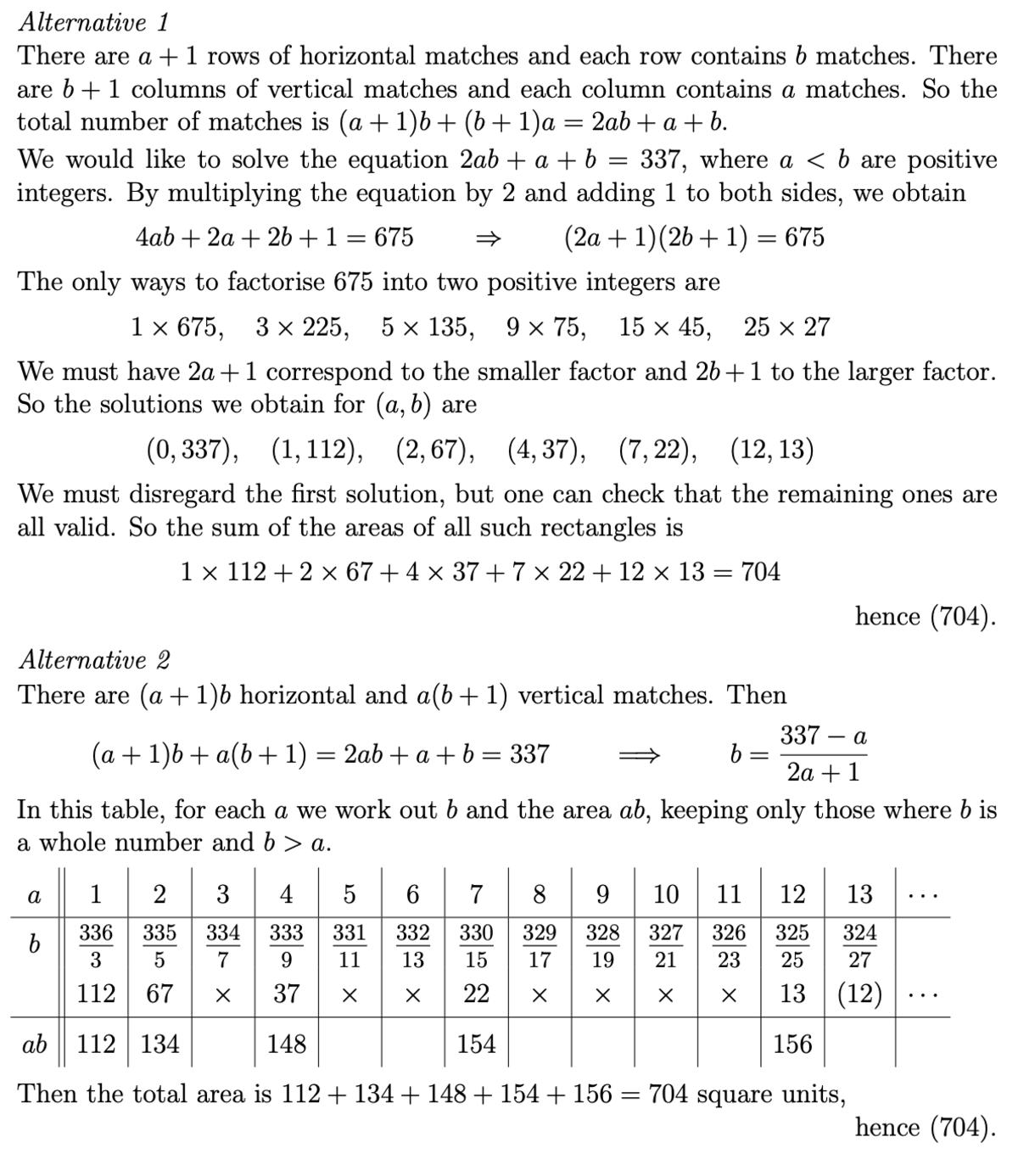This section requires Javascript.
You are seeing this because something didn't load right. We suggest you, (a) try
refreshing the page, (b) enabling javascript if it is disabled on your browser and,
finally, (c)
loading the
non-javascript version of this page
. We're sorry about the hassle.
3 solutions
a ( b + 1 ) + b ( a + 1 ) = 3 3 7 ⇒ 2 a b + a + b = 3 3 7 ⇒ 2 ( 2 a b + a + b ) + 1 = 2 × 3 3 7 + 1 ⇒ ( 2 a + 1 ) ( 2 b + 1 ) = 6 7 5 = 3 3 × 5 2
| 2 a + 1 | 2 b + 1 | a | b | a × b |
| 3 | 225 | 1 | 112 | 112 |
| 5 | 135 | 2 | 67 | 134 |
| 9 | 75 | 4 | 37 | 148 |
| 15 | 45 | 7 | 22 | 154 |
| 25 | 27 | 12 | 13 | 156 |
∴ S u m = 1 1 2 + 1 3 4 + 1 4 8 + 1 5 4 + 1 5 6 = 7 0 4


Let's try and solve the general case. Say there are M matches in total, and we want to know the sum of the areas of the rectangles we can make with them with sides a < b .
From the diagram, it's clear that M = a ( b + 1 ) + b ( a + 1 ) = 2 a b + a + b
Doubling and adding one allows us to factorise: 2 M + 1 = 4 a b + 2 a + 2 b + 1 = ( 2 a + 1 ) ( 2 b + 1 )
Now, the quantity we're after is S = ∑ a b over all pairs a < b satisfying ( 2 a + 1 ) ( 2 b + 1 ) = 2 M + 1 .
Note that, from the first equation, a b = 2 1 ( M − a − b ) for these pairs; so the sum is S = 2 1 ∑ ( M − a − b ) = 4 1 ∑ ( 2 M + 2 − ( 2 a + 1 ) − ( 2 b + 1 ) )
So we're interested in the number of divisors of 2 M + 1 , and their sum; the first gives twice the number of solution pairs 2 a + 1 , 2 b + 1 , and the second their sum. These two functions are usually denoted σ 0 and σ 1 respectively.
If the prime factorisation of x is x = p 1 k 1 p 2 k 2 ⋯ p r k r
then we have σ 0 ( x ) = ( 1 + k 1 ) ( 1 + k 2 ) ⋯ ( 1 + k r ) and σ 1 ( x ) = p 1 − 1 p 1 k 1 + 1 − 1 ⋅ p 2 − 1 p 2 k 2 + 1 − 1 ⋯ p r − 1 p 1 k r + 1 − 1
Returning to our formula for S , S = 4 1 ∑ ( 2 M + 2 − ( 2 a + 1 ) − ( 2 b + 1 ) ) = 4 1 [ ( M + 1 ) σ 0 ( 2 M + 1 ) − σ 1 ( 2 M + 1 ) ]
Note we would have to be careful if 2 M + 1 happened to be a square number (why?), but in this case, it's not.
In the question, M = 3 3 7 and 2 M + 1 = 6 7 5 = 3 3 ⋅ 5 2 . Using the above formulas, σ 0 ( 6 7 5 ) = 1 2 and σ 1 ( 6 7 5 ) = 1 2 4 0 , so S = 4 1 [ 3 3 8 ⋅ 1 2 − 1 2 4 0 ] = 7 0 4